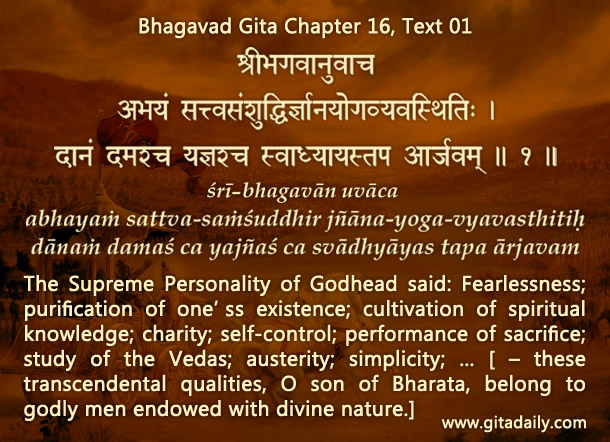Fear is often a significant inhibitor, preventing us from engaging in enterprising activities that may be necessary to fulfill our potentials and do justice to our God-given talents. Excessive fear can render a person feckless and spineless, incapable of standing up for their values, individuality, self-respect, or spirituality. Dominance by fear can reduce a precious and potent spiritual being, who is a part of the divine, to a cipher merely crawling through existence, constantly paranoid about being attacked by others or even of just offending others.
Given this inhibiting power of fear, freedom from fear or fearlessness is an asset. And it is a virtue praised in the Bhagavad-Gita (16.01). But does being fearless mean a total elimination of fear? No; fear can serve as a natural psychological mechanism that alerts us to potential danger — it can prevent us from making unnecessary rash choices and blindly rushing into avoidable troubles. While trying to fight the paralyzing influence of fear, it is easy to swing to the other extreme: becoming reckless. This, too, can prevent individuals from fulfilling their potentials because they get entangled in unnecessary obstacles, even self-created troubles.
The key to finding balance lies in focusing on something greater than just dealing with fear. When we have a worthwhile cause to work for, such as doing justice to a God-given talent or advocating for cherished values, the resulting purposefulness enables us to choose our battles with due deliberation. We neither run away from battles spinelessly nor charge into battles headlessly.
The Bhagavad-gita, with its profound philosophical deliberation, guides Arjuna and all its readers towards purposeful bravery while battling life’s many challenges. Equipped with Gita wisdom, we can avoid the extremes of letting fear become too important or dismissing fear as utterly unimportant — and instead respond to it with intelligence.
Summary:
Be not feckless, caving in to fear; be not reckless, neglecting the warnings of fear — be fearless by letting fear inform our deliberations, but not control our decisions.
Think it over:
- What happens when fear becomes too significant for us?
- What happens when we dismiss fear as utterly unimportant?
- How can we treat fear with deference?
***
16.01: Fearlessness; purification of one’s existence; cultivation of spiritual knowledge; charity; self-control; performance of sacrifice; study of the Vedas; austerity; simplicity … – these transcendental qualities belong to godly men endowed with divine nature.
Audio explanation of the article is here: https://gitadaily.substack.com/p/feckless-reckless-fearless

To know more about this verse, please click on the image

what a magnificent and inspiring text about fear.
thanks gitadaily.com !!
A divine insight/inspiring…Uplifting
Happy to be of service.